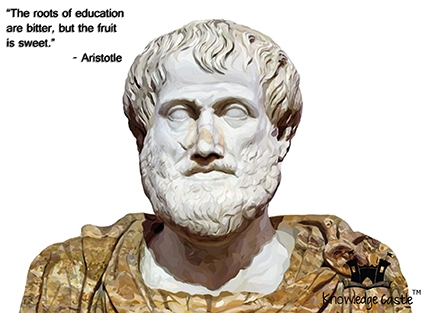In Need of Those Aristotelian Virtues
Op-Ed
On May 26, Georgia will celebrate the centennial anniversary of its national sovereignty. The story of independence is long and widely told, so I will not deliberate on facts historical. I would rather wax philosophical this time. Life has certainly changed in Georgia in the last 100 years, as it has in the rest of the world, but the nature of our character - temperament, values, and attitudes - has gone through only a barely-noticeable modification, having remained almost the same, in fact. For instance, putting it a little jovially, the Aristotle philosophy stays still unappreciated in this country, and the great man’s moralistic values have not quite become a yardstick through which to measure our national character.
To my unassuming mind, moderation is still mocked in this culture, where temperance, or self-control, has no considerable weight. If westernization still means anything to us, then the ceaseless daydreaming about NATO and EU alone will not promote our cause. The gist of the matter lies in our character, which is miles away from what we call “western.” On the other hand, what I’m going to say now is just a mere statement, devoid of facts and specific cases. My only concern is the Aristotelian virtues, concentrated on moderation: would it do this nation any good, if, by any possible presumption, such were put to life here?
It is my belief that genuine courage as such, oriented on reasonable purposes, would successfully work in our reality as a moderate feature of human character versus the commonplace foolhardiness that is killing the prospect of our steady development. Correct me if I’m wrong, but the excessive foolhardiness is a part of our character which does not uphold the purpose of our membership in the family of western nations. Foolhardiness is not what has moved the West forward. It was courage and wisdom taken together that did it. So please let us know well the difference between the courage preferred by Aristotle, and the foolhardiness utterly discarded by him.
If we could add more temperance to our style of action, excluding the licentiousness often demonstrated in our everyday life, that might be helpful too. Proceeding with Aristotelian vocabulary, descriptive of our character, vanity is one of the epithets to be used here. The prudent Greek prompts us to equip ourselves with magnanimity instead. Irascibility is also conspicuous in the interaction among the Georgians, whereas gentleness would have been more rational to exercise with aims of achieving a consensus in our quarrels and clashes. We also lack truthfulness because we suffer the case of severe preponderating towards boastfulness and ambition. It would also be very winsome if the average Georgian managed to go more for kindhearted and well-meant wit rather than regular, and often wicked, buffoonery. The obvious obsequiousness and repulsive flattery should be rejected too, and friendliness be taken up as the best instrument to hit the cherished targets. It would also work in our own favor if we said no to bashfulness in favor of modesty. We must also learn without delay that envy is mortifying and it curtails our lifespan, and only the righteous indignation can do the right trick.
And finally, justice: the sum of all values, known to humankind, will have to be fully introduced and cultivated on our soil.
All those Aristotelian virtues sound like theory that would either be defied or entertained by our people, who need a perpetual reminder of what is good and what is evil. This is the way I would congratulate Georgia and its good people with the rounded national day and wish my beloved nation to elevate itself to the values that are accelerating its admittance into western circles and structures that we so badly need to be part of. Our social culture is hungry for those Aristotelian values, based on temperance and moderation, making life easier, much easier for all of us.
By Nugzar B. Ruhadze












